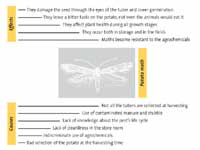Gabriele Stoll
Natural Crop Protection in the Tropics
Letting Information Come to Life
Letting information come to life
|
|
||
|
Potato Moth Control with Local
Plants in the Storage of Potato
|
|
|
|
|
 |
|
Letting information come to life
Potato Moth Control with Local Plants in
the
Storage of Potato
by Norma Canales Rivera (GIAREC),
Raúl Canto Retamozo (Yanapai Group)
Introduction
In Peru, potato production is a
traditional activity developed by small farmers of the Andes
under difficult ecological, socio-economical and political
conditions. The potato represents one of the major
accomplishments in the domestication of wild plants by the
Incas. In large parts of the Andes, this crop is the most
important staple food for the local population.
In the 1950’s, with the increasingly
commercial orientation of potato production, international
agricultural research centres developed and introduced hybrid
varieties, generally known as "improved". These are
characterized by a short vegetation period in combination with
the application of high amounts of external inputs,
particularly fertilizer. The increasing adoption of these
varieties in the Andes led to a process of substitution of the
native varieties for "improved" varieties, causing a
reduction of genetic diversity in terms of loss of varieties.
On the other hand, the limited economic capacity of the small
farmers could not cope with the demands of the
"improved" varieties, which generated an increased
susceptibility to insect pests and diseases, and which
decreased the production and productivity of potatoes of the
small farmers.
Inter-Institutional collaboration and
arrangements
In 1995, the ILEIA Project of the ETC
Foundation (Netherlands) established an alliance with
non-governmental organizations (YANAPAI GROUP, IDEA-PERU,
REDES) and agricultural research centres (CEA-Universidad
Nacional del Centro, INIA-Ministry of Agriculture,
IVITA-Universidad Nacional Mayor de San Marcos) of the central
sierra of Peru, in order to evaluate the viability of
Low-External Input Sustainable Agriculture (LEISA) as an option
for alternative development.
The Collaborative Group of Agroecological
Research – Central Region (GIAREC) was created as an
inter-institutional platform in order to promote a process of
innovation and improvement of agro-pastoral practices and
customs within the context of strengthening the technological,
organizational, and political capacities with LEISA criteria,
oriented towards sustainability.
LEISA is an approach to agricultural
development, promoted by ILEIA, to revert the negative effects
of the 'modernization' of agriculture for small farmers and to
improve food self-sufficiency, as well as to conserve natural
resources and contribute to social equity. It is based upon the
active participation of both male and female farmers, their
knowledge of the ecosystem, local culture, their experience
developed through empirical experimentation, and the continued
adaptation of technologies to their own conditions. It also
attempts to develop an environmental awareness which would lead
to a rational use of the local resources as well as external
inputs. Further it intends to strengthen the capacities and
abilities which encourage the adaptation of agricultural
production to the local needs and changing conditions, and to
give the necessary competencies to the farmers – both men
and women – in order to shape their future based on their
knowledge, skills, values, culture, and local institutions.
Within this approach, Participatory
Technology Development (PTD) became the central methodological
pillar to strengthen the capacity of rural people in
experimentation and innovation. Through a process of
interaction of knowledge and experience among the farmers, the
agricultural research centres and the non-governmental
development organizations (members of the GIAREC) it is
expected that the farmers are enabled to better develop
agricultural techniques appropriate to the specific
agroecological and socio-economical context
Causes and Effects
Participatory Technology Development (PTD)
Participatory Technology Development (PTD)
is based on a research approach which is controlled by the
farmers. It can be characterized as a process of creative
interaction between farmers and researchers, which intends to
develop or adapt technologies suitable to solve specific local
problems and which contribute to the development of sustainable
production systems.
In PTD, the farmer is the main actor in
decision-making during the whole research process, from
diagnosis through implementation to the dissemination of the
results. Formal research assumes a complementary, supportive
role (675). With this methodology, farmers define the research
agenda, they define the design and variables, and they are
actively involved in the implementation of the experiment, the
monitoring, and evaluation.
The printed version contains more
information about the following themes:
Learning the key concepts of PTD and
identifying interest groups
Understanding the problems and
production potentials
Visualizing causes and effects of the
problem
Searching for solutions to test
Organizing the experiments and
encouraging local skills
Designing, implementing and managing
the experiments
Evaluating the experiments
Lessons learned
